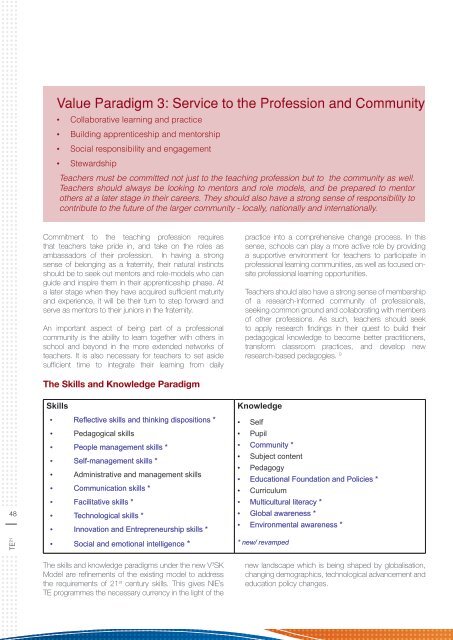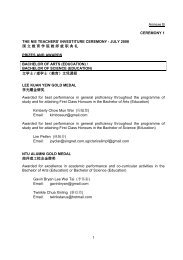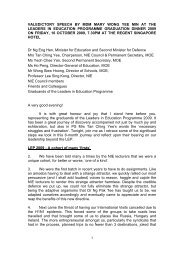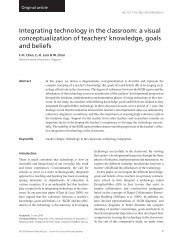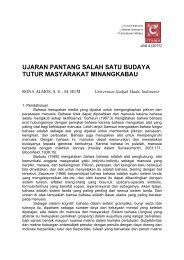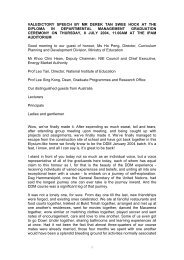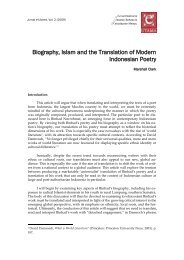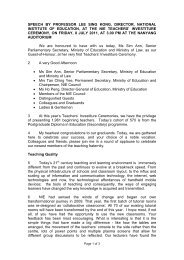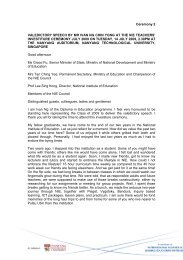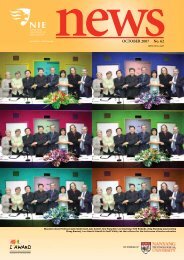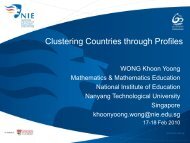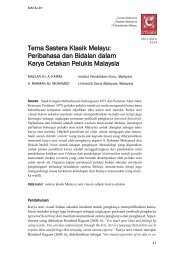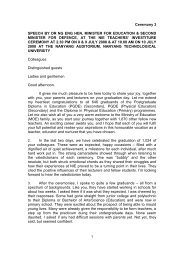A Teacher Education Model for the 21 Century - National Institute of ...
A Teacher Education Model for the 21 Century - National Institute of ...
A Teacher Education Model for the 21 Century - National Institute of ...
You also want an ePaper? Increase the reach of your titles
YUMPU automatically turns print PDFs into web optimized ePapers that Google loves.
48<br />
48<br />
48<br />
TE <strong>21</strong><br />
Value Paradigm 3: Service to <strong>the</strong> Pr<strong>of</strong>ession and Community<br />
• Collaborative learning and practice<br />
• Building apprenticeship and mentorship<br />
• Social responsibility and engagement<br />
• Stewardship<br />
<strong>Teacher</strong>s must be committed not just to <strong>the</strong> teaching pr<strong>of</strong>ession but to <strong>the</strong> community as well.<br />
<strong>Teacher</strong>s should always be looking to mentors and role models, and be prepared to mentor<br />
o<strong>the</strong>rs at a later stage in <strong>the</strong>ir careers. They should also have a strong sense <strong>of</strong> responsibility to<br />
contribute to <strong>the</strong> future <strong>of</strong> <strong>the</strong> larger community - locally, nationally and internationally.<br />
Commitment to <strong>the</strong> teaching pr<strong>of</strong>ession requires<br />
that teachers take pride in, and take on <strong>the</strong> roles as<br />
ambassadors <strong>of</strong> <strong>the</strong>ir pr<strong>of</strong>ession. In having a strong<br />
sense <strong>of</strong> belonging as a fraternity, <strong>the</strong>ir natural instincts<br />
should be to seek out mentors and role-models who can<br />
guide and inspire <strong>the</strong>m in <strong>the</strong>ir apprenticeship phase. At<br />
a later stage when <strong>the</strong>y have acquired sufficient maturity<br />
and experience, it will be <strong>the</strong>ir turn to step <strong>for</strong>ward and<br />
serve as mentors to <strong>the</strong>ir juniors in <strong>the</strong> fraternity.<br />
An important aspect <strong>of</strong> being part <strong>of</strong> a pr<strong>of</strong>essional<br />
community is <strong>the</strong> ability to learn toge<strong>the</strong>r with o<strong>the</strong>rs in<br />
school and beyond in <strong>the</strong> more extended networks <strong>of</strong><br />
teachers. It is also necessary <strong>for</strong> teachers to set aside<br />
sufficient time to integrate <strong>the</strong>ir learning from daily<br />
The Skills and Knowledge Paradigm<br />
Skills<br />
• Reflective skills and thinking dispositions *<br />
• Pedagogical skills<br />
• People management skills *<br />
• Self-management skills *<br />
• Administrative and management skills<br />
• Communication skills *<br />
• Facilitative skills *<br />
• Technological skills *<br />
• Innovation and Entrepreneurship skills *<br />
• Social and emotional intelligence *<br />
The skills and knowledge paradigms under <strong>the</strong> new V 3 SK<br />
<strong>Model</strong> are refinements <strong>of</strong> <strong>the</strong> existing model to address<br />
<strong>the</strong> requirements <strong>of</strong> <strong>21</strong> st century skills. This gives NIE’s<br />
TE programmes <strong>the</strong> necessary currency in <strong>the</strong> light <strong>of</strong> <strong>the</strong><br />
practice into a comprehensive change process. In this<br />
sense, schools can play a more active role by providing<br />
a supportive environment <strong>for</strong> teachers to participate in<br />
pr<strong>of</strong>essional learning communities, as well as focused onsite<br />
pr<strong>of</strong>essional learning opportunities.<br />
<strong>Teacher</strong>s should also have a strong sense <strong>of</strong> membership<br />
<strong>of</strong> a research-in<strong>for</strong>med community <strong>of</strong> pr<strong>of</strong>essionals,<br />
seeking common ground and collaborating with members<br />
<strong>of</strong> o<strong>the</strong>r pr<strong>of</strong>essions. As such, teachers should seek<br />
to apply research findings in <strong>the</strong>ir quest to build <strong>the</strong>ir<br />
pedagogical knowledge to become better practitioners,<br />
trans<strong>for</strong>m classroom practices, and develop new<br />
research-based pedagogies. 9<br />
Knowledge<br />
• Self<br />
• Pupil<br />
• Community *<br />
• Subject content<br />
• Pedagogy<br />
• <strong>Education</strong>al Foundation and Policies *<br />
• Curriculum<br />
• Multicultural literacy *<br />
• Global awareness *<br />
• Environmental awareness *<br />
* new/ revamped<br />
new landscape which is being shaped by globalisation,<br />
changing demographics, technological advancement and<br />
education policy changes.


